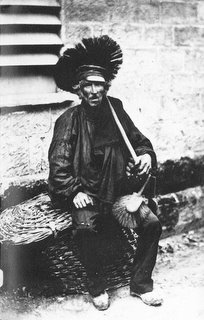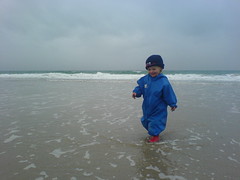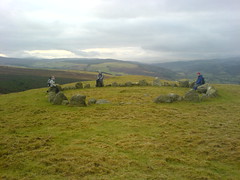The Sacraments of Eucharist and Baptism
Here's the third and final piece which I wrote for my vocations adviser:
Here I will give a brief overview of my understanding of the sacraments of Eucharist and Baptism. Once again I am aware that there has been much ink (and blood!) spilled over the nature of these sacraments, and whatever I say here will only touch upon what is a huge subject.
I will begin by my understanding of sacraments in general. I believe a Christian sacrament is a physical action/rite which has been instituted by Christ that when combined with faith is a means of grace to those who partake in it. I do not believe that sacraments are automatically effective, no matter who they are given to, as this idea would seem to be more akin to magic, and could encourage superstition. On the other hand, I don’t believe that they are merely symbolic. When administered correctly, I believe that the sacraments effect what they signify. The key question being ‘what constitutes correct administration?’ (a question which I don’t intend to answer here!). I believe that there is an aspect of mystery to the sacraments (one of the origins of the term) which belies explanation – trying to explain how they work somehow misses the point. Nevertheless, there are depths of meaning and multi-levelled symbolism that are there to be explored.
Eucharist – The Meal Jesus Gave Us
“This is my body, which is given for you. Do this in remembrance of me”
In the bread and the wine of the Eucharist I believe that we meet Christ in a special way. There is a whole spectrum of beliefs as to what is happening in the bread and wine. At one end of the spectrum are the Roman Catholics who believe that the bread and wine become the literal body and blood of Christ in the miracle of transubstantiation, at the other end are the low-church evangelicals who, following Zwingli, believe that the bread and wine are just a remembrance of Christ’s death. I think I fall somewhere in the middle. I believe that when approached in faith Christ is really present in the bread and the wine so that they are to us, in a spiritual sense, the body and blood of Christ.
The Eucharist is of course a remembrance of the sacrificial death of Christ on the cross, and all that it achieved. Each time we partake in it we appropriate once again the benefits of the cross, forgiveness of sins and new life in Christ. It is a thanksgiving (eucharist), and a celebration.
In the same way that the Passover meal remembered the liberation of Israel from slavery in Egypt, the Lord’s supper remembers the New Exodus that Jesus achieved on the cross.
It is more than a remembrance, however. I believe that when we approach them in the right way the bread and the wine of the Eucharist really do feed us in a spiritual sense. They focus our lives on the central facts of our faith and prevent us from drifting off into an unmediated, mystical spirituality.
The bread and the wine are an offering. We take what has been given by God, the wheat and the grapes, we make bread and wine from them and offer them back to God. God then makes them to be the body and blood of Christ and gives them back to us. We eat and give Him thanks! There is a continual, relational interaction between God and us.
“For as often as you eat this bread and drink the cup, you proclaim the Lord’s death until he comes”
The Eucharist is where past, present and future meet for Christians. Each time we celebrate the Eucharist, in the present, we are connecting with the Easter victory of Christ and anticipating the consummation of that victory when He comes in the future. We remind ourselves that we are living in the ‘time between the times’. This passage also tells us that in the symbolic action of the Eucharist, we are actually preaching the gospel in a way that goes beyond words. We are rehearsing the central drama of our faith and finding our place in the story.
There is also a ‘horizontal’ aspect to the Eucharist, Holy Communion. As well as communion with God it is communion with all those who belong to the New Covenant community. It is the family meal. I believe that Holy Communion should be a truly ecumenical celebration. There is one body. It is a tragedy that so often the Eucharist has become a source of division within the church, when the Lord’s table should be the one place that all those who trust in Christ as their Lord and saviour are able to come together. – Story about Vineyard pastors at the Vatican.
There is a sombre warning in 1 Corinthians that whoever eats the bread and drinks the cup should examine themselves to make sure they are not doing so in an unworthy manner. They are to ‘discern the body’. I believe this has a double meaning. Discerning the body as in the death of Christ that it represents, and discerning the body as in the body of Christ the church, and making sure that one has not been a cause of division within that body. Paul even warns that those who don’t discern the body are eating and drinking judgement upon themselves, resulting in sickness or even death! If this is the result of the sacrament being abused, then when it is approached correctly it must bring healing and life.
This presumably has implications for priesthood and who is ‘allowed’ to partake in the Eucharist. Are there occasions when it is appropriate for the priest to deny people communion?
Water Baptism
If the Eucharist is the family meal, then baptism is a sign of entrance into the family. In baptism we are entering the New Covenant community. Baptising people is part of the ‘making disciples’ mandate of the great commission. I believe that water baptism is one part of the nexus of Christian initiation which includes repentance, water baptism, reception of the Spirit and faith in Christ.
I can see several aspects to water baptism.
A new beginning/birth. You enter a family when you are born. In baptism you are entering a new family. John 3:5 talks about being born of water and spirit.
A wash for the dirty. In baptism our sins are washed away and we are made clean.
A burial for the dead. In baptism, our old life is buried and we are raised into our new life with Christ. (Burial would seem to be especially well symbolised by full immersion, although sprinkling of earth does of course happen at burials too!)
Identifying with and being united with the death and resurrection of Jesus. Romans 6:3-5
A public declaration of faith. Baptism is a very public way of declaring our allegiance to Jesus as Lord. We leave behind our old allegiances and pledge ourselves to follow Christ.
A sign of the New Covenant. As with the Eucharist there are connections with the New Covenant. The waters of baptism recall the crossing of the Red sea and the Jordan whereby the people of Israel were delivered from slavery and entered into their inheritance. Some also see a replacement of the old covenant sign of circumcision with the new covenant sign of baptism.
Some of these aspects seem more appropriate to the baptism of believers. What about the baptism of infants?
There are historical understandings of infant baptism that I struggle with. For Augustine, and many following, the doctrine of ‘original sin’ meant that unbaptised infants who died were hell-bound, and therefore by baptising a baby you were giving him or her a better chance of salvation. This seems to portray a rather bizarre view of God, in my opinion, and would seem to be little more than superstition. I am much happier with a ‘covenantal’ view of infant baptism. I believe that the children of believers are to be considered full members of the new covenant community, and it may therefore be appropriate to give them the sign of this fact. (Incidently, I also believe this is an argument for giving these children communion –question: at what age may children be confirmed/take communion?)) Given my stated understanding of a sacrament – a means of grace, when combined with faith – in the case of the baptism of believers children, the faith must be ‘by proxy’, expressed by the parents on behalf of the child. Question - in the case of unbelieving parents presenting a child for baptism, where is the faith? Is it in the priest, or the church members, or both? Or is the actual presenting of the child seen as a step of faith on behalf of the parents?
Much more that could be written but once more time has defeated me, and I’m sure there’s more than enough here to discuss!






